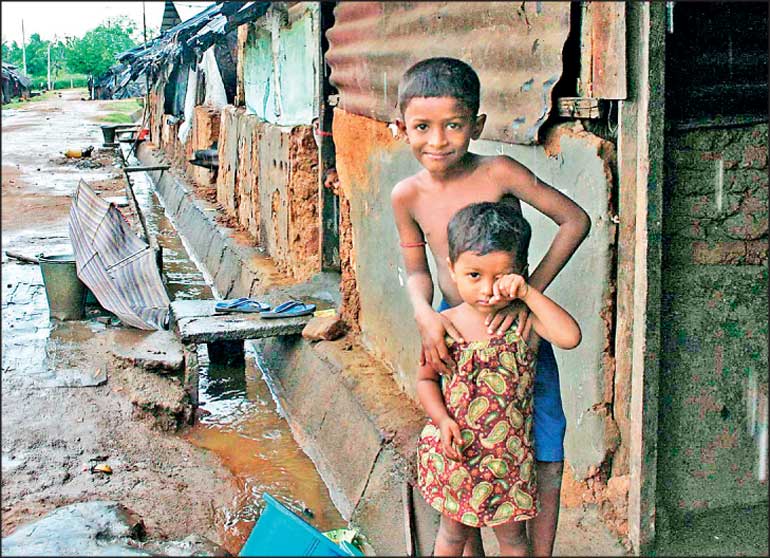Monday Feb 23, 2026
Monday Feb 23, 2026
Saturday, 6 August 2022 00:30 - - {{hitsCtrl.values.hits}}

Nearly one in three parents responding to Save the Children’s survey in June 2022 have noticed negative changes in their children’s behaviour in the last six months.
Since the beginning of the economic crisis, children have showed signs of distress and withdrawal. The survey of over 2,300 families across nine districts in Sri Lanka also found nearly three out of four households had to spend more time with their children to accommodate their emotional and mental health needs.
Soaring inflation, daily power cuts and shortages of fuel, food and medicines have stretched families beyond their ability to cope. The economic stress on families has triggered one in 10 children to experience changes in their appetite and show more signs of aggression.
Save the Children’s survey also found that one in five children experienced changes in their sleep patterns, had difficulty regulating their emotions, showed violence towards others or wet their beds.
Lakmi* is a 10-year-old girl from Rathnapura, Sri Lanka. She cannot go to school on days buses are not available and talks about witnessing long fuel queues in her town.
“The situation in the country makes me very sad. I am afraid that we won’t have a country at the end of all this. There are problems with fuel and the prices of food have also increased,” said Lakmi. “If I had the chance to do something for my country, I would work for the betterment of the people.”
Thisal* is a 13-year-old boy from Badulla and he shared: “I don’t have a way to continue my learning properly because schools are often closed. I am scared that if exams are held, I might get low marks.”
Nadeesha*, 37, a mother from Badulla, explained that the financial pressure this crisis is having on her as a parent is having an influence on her children’s mental wellbeing: “I have observed many big changes in my children’s behaviour. They are sad about the situation, but they try not to show it. They tend to worry because I am unable to provide them with what they like, the way I used to do. They worry that their parents don’t have a steady income to support the family. They are not happy like before. They don’t go out much to play. They are worried about what’s going to happen tomorrow.”
According to the UN’s Sri Lanka Humanitarian Needs and Priorities Plan, although Sri Lanka’s economic crisis is leading to a significant rise in mental health issues, the country cannot provide adequate Mental Health and Psychosocial Support (MHPSS) for those who need it due to the lack of financial resources. Without appropriate MHPSS, the mental health impact of the crisis on children can worsen, leading to poorer chances of long-term wellbeing and resilience.
Save the Children’s National Director in Sri Lanka Julian Chellappah said: “In difficult and unsettling situations, children may externalise their feelings by showing signs of distress, with more crying and screaming among young children, more aggressive behaviour or violence, as well as difficulties in emotional regulation. Some will internalise their feelings, resulting in withdrawal. This is what we’re seeing unfold in Sri Lanka.”
“Children often find it hard to make sense of crisis and often need support from family and friends to help them understand and cope with the resulting adversities. If children do not get the support they need, their symptoms can worsen. The constant worry over accessing food, clean water, medicines and even education is taking an immense toll on Sri Lankan children.
“We are calling on the Government to find a sustainable economic solution to this crisis, to get families back on their feet and ensure children’s long-term mental health needs are prioritised and adequately funded,” she added.
Save the Children in Sri Lanka is releasing its first Rapid Needs Assessment report, aimed to understand how communities are impacted by the ongoing crisis. The organisation is responding to the needs of vulnerable families with plans to provide cash and livelihood support for nearly one million people. Save the Children’s humanitarian response strategy will also prioritise Mental Health and Psychosocial Support (MHPSS) by raising community awareness and empowering communities, both adults and children, to support each other’s psychosocial wellbeing in these tremendously distressing times.
The survey data was collected from May to June 2022 from a total of 2,309 households across nine districts in Sri Lanka. Every household had children. The minimum sample size of 245 households in each province provides a 90% confidence interval and a 5% margin of error for the target population.
Aspects of mental health and psychosocial well-being in children and adults were measured through self-assessment and observational rating scales, covering a number of positive and negative feelings as well as changes in children’s behaviour.
As per the survey 12.7% of families noticed changes in their children’s appetite and 21.5% of families noticed their children either experienced changes in emotional regulation, changes in sleep patterns, unusual crying and screaming, showing violence towards others or wetting their beds.